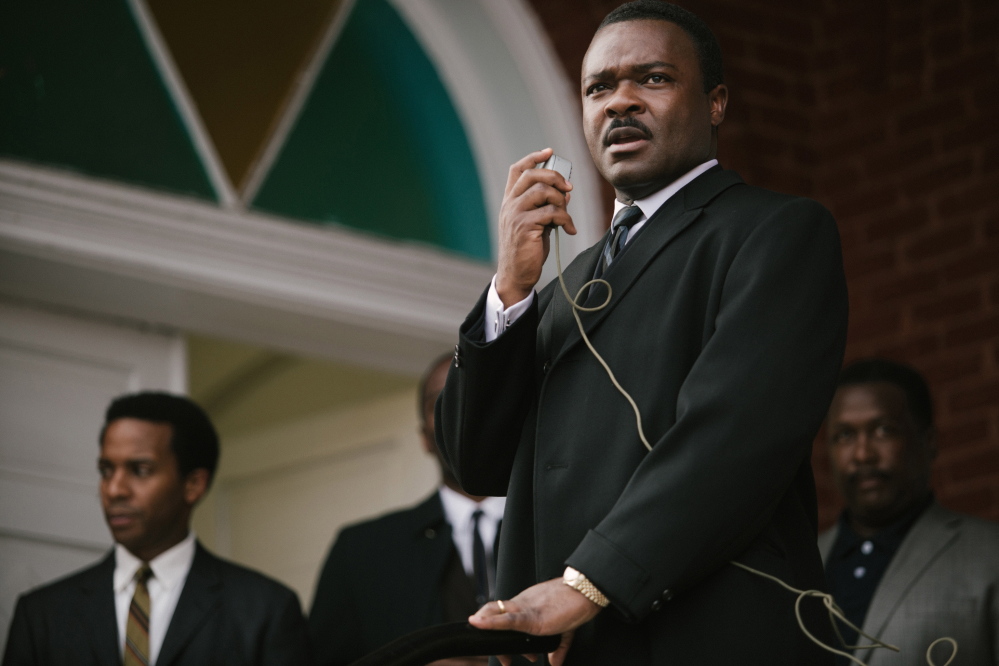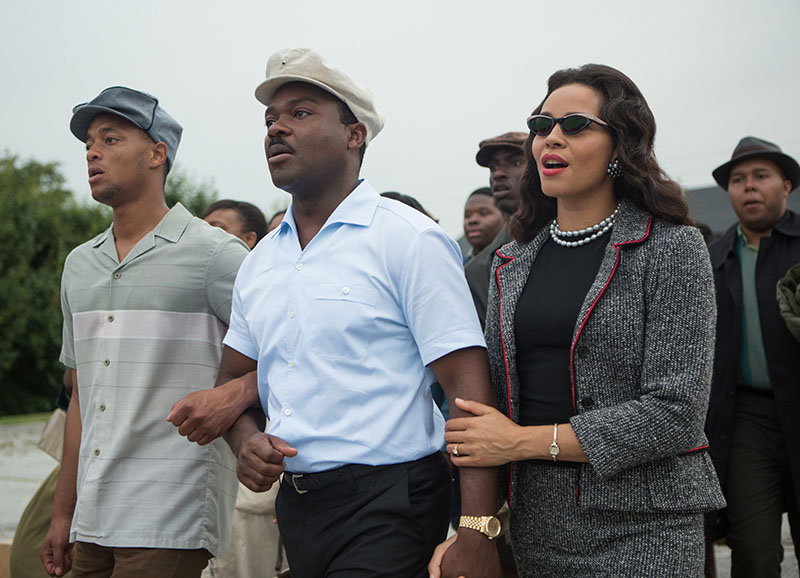The day the Ferguson grand jury’s decision was announced, actor David Oyelowo was in Atlanta to discuss his portrayal of the Rev. Martin Luther King Jr. in “Selma.” In a matter of hours, the St. Louis suburb would be rocked by protests and a spasm of violence that gave way to more peaceful demonstrations around the country following the decision not to indict Officer Darren Wilson in the shooting death of Michael Brown.
“Selma,” filmed largely in metro Atlanta with key scenes shot in the Alabama town made infamous when hundreds of peaceful civil rights marchers bound for Montgomery were attacked by state and local police officers in 1965, opened on Christmas Day in New York, Washington, D.C., Los Angeles and Atlanta. It will be released nationwide on Friday.
A powerful work already nominated for a best-picture Golden Globe and expected to pick up an Academy Award nod, it tells the story of the Selma-to-Montgomery march and the movement that ultimately led to the Voting Rights Act of 1965. In addition to Martin and Coretta King, the movie prominently includes characters such as U.S. Rep. John Lewis, Andrew Young and the late Hosea Williams.
Oyelowo prepared to march in Martin Luther King Jr.’s shoes with prayer. “When I first read the script in 2007 I literally felt God telling me I was going to play this role,” he said. “I wrote it down in my prayer diary. I took a gamble and said, ‘Dear God, I pray that something will come through me that is not of me.’ ”
Shortly before filming began at locations including the Georgia State Capitol and the Marietta-Cobb Museum of Art, Oyelowo visited the Martin Luther King Jr. Center for Nonviolent Social Change and met with the Rev. Bernice King, the center’s CEO and daughter of the civil rights icon.
“She said, ‘That’s no joke, what you’re about to take on here. Let me pray for you,’ ” he recalled.
Since King’s speeches – which are property of the King family estate – had already been licensed several years ago for a biopic to be produced by Steven Spielberg, “Selma” director Ava DuVernay had to figure out how to rewrite many of King’s speeches and words.
“There’s never been a major motion picture with King at the center, at least in theaters, and a lot of it was because of the intellectual property,” DuVernay said in an interview with Yahoo Movies. “So I just unanchored myself from the words and went not even line-by-line, but word for word, to try to really understand what he was trying to say and then just say it in a different way.”
The film has received an emotional endorsement from John Lewis, who as a young man was badly beaten by Alabama state troopers on the “Bloody Sunday” march across Selma’s Edmund Pettus Bridge.
“I was very moved by the film ‘Selma,’ ” he said. “It just took me back. I cried at several places in the film. It just made it so real.”
He remembers having to sit in the balcony during movies while growing up in Pike County, Alabama.
“The little white children would sit downstairs,” Lewis said, recalling being told, “That’s just the way it is,” and “Don’t make trouble,” when he questioned the disparity. “To go from that to having someone play me in a movie, it says something about America and the progress that has been made,” Lewis said. “It’s almost too much to believe to see yourself in the theater.”
Despite the progress yet to be made, Lewis is hopeful. “We will lay down the burden of racism,” he said. “Sometimes I feel like we should be doing better. But I feel like we should be grateful for the distances we have come. We will get there. (‘Selma’) should speak to people today. We must be committed to the way of peace, love and nonviolence.”
While “Selma” is a period piece, complete with vintage cars and clothing and historical artifacts like phone booths, it feels timely, given the strife our nation has experienced in recent months, including the recent shooting deaths of two New York police officers.
“The notion that we are in a post-racial society is a complete fallacy,” said Oyelowo, who has been nominated for a best actor Golden Globes award and is a sure bet to pick up an Oscar nod. “You only have to juxtapose the images we see (in the film) with those coming out of Ferguson.”
The movie’s ballad “Glory,” by John Legend with Common, who plays activist James Bevel in the movie, also links the struggles of the civil rights era to current protest movements.
“The movement is a rhythm to us. Freedom is like religion to us.… That’s why Rosa sat on the bus. That’s why we walk through Ferguson with our hands up.”
“Glory” is up for a best original song Golden Globe.
Carmen Ejogo, who plays Coretta Scott King, hopes “Selma” can inspire unity and progress.
“There’s a real chance that the reaction to it will be specific and strategized, that it might have a chance at becoming something substantial in terms of change,” she said. “I’m excited that ‘Selma’ may in some way be a useful tool.”
“Selma” is the second movie starring Ejogo as Coretta Scott King, who died in 2006. The two met after Ejogo’s performance in the 2001 HBO project “Boycott.”
“I really wasn’t prepared for the regalness and the stoic stillness of the woman,” Ejogo said. “When I went in the room to finally meet her I literally burst into tears and had to walk back out. I had to compose myself and try again.”
The two became friends easily. “At the end of the evening we were singing arm-in-arm ‘We Shall Overcome,'” Ejogo said. “I really felt excited by the chance to play her a second time.”
Oprah Winfrey, who served as a “Selma” producer and also played the role of Annie Lee Cooper, a nurse determined to register to vote, was a source of guidance and inspiration during the filming.
“She was more of a mother to me,” Oyelowo said. “I remember her calling me saying, ‘Why are you up? You need to go to bed!’ She was there for support and encouragement.”
DuVernay, the first black woman to earn best director honors at the prestigious Sundance Film Festival for “Middle of Nowhere,” also starring Oyelowo, is up for a best director Golden Globe.
“Our approach was to illuminate something about Dr. King,” she said. “The deep history of the movement is not taught in schools in the way we would like. I think the film speaks to what is going on in the country right now.”
Could “Selma” be the healing moment our country needs after being so riven by racial discord?
“As a storyteller I don’t ask any intention of what people will do. My desire is for it not to be disposable entertainment,” she said. “I don’t feel like a film is a healing moment. A healing moment is people taking to the streets. If it triggers conversation, that would be a beautiful thing.”
Send questions/comments to the editors.




Success. Please wait for the page to reload. If the page does not reload within 5 seconds, please refresh the page.
Enter your email and password to access comments.
Hi, to comment on stories you must . This profile is in addition to your subscription and website login.
Already have a commenting profile? .
Invalid username/password.
Please check your email to confirm and complete your registration.
Only subscribers are eligible to post comments. Please subscribe or login first for digital access. Here’s why.
Use the form below to reset your password. When you've submitted your account email, we will send an email with a reset code.